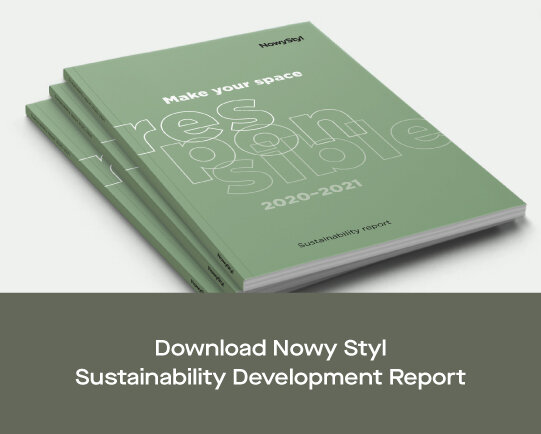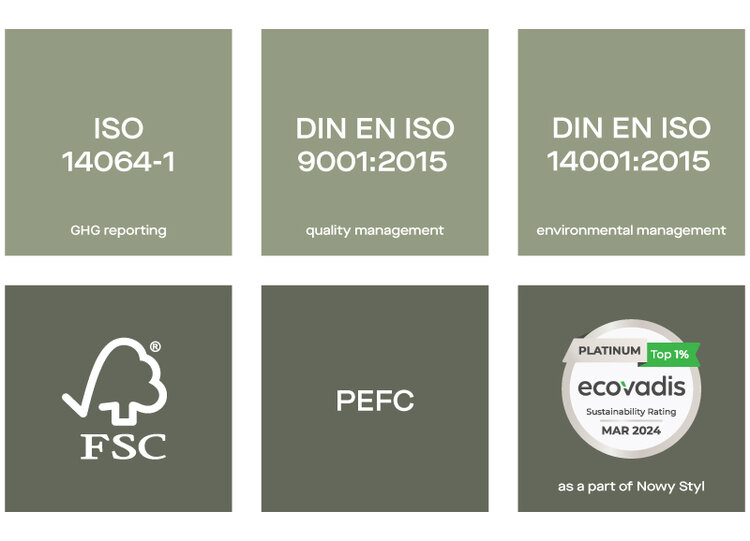
We believe that sustainability is the feasible and affordable combination of environmental awareness, commercial interests, and CSR, not only for products, but especially for communication with people, employees, and partners as well.
Aware of the fact that by acting now, we are ensuring that coming generations have a future, we live and breathe sustainability at Kusch+Co across all divisions.
This idea constantly guides us through the entire product life cycle: from the design stage, through development and production processes, packaging, delivery, and long service lives, to recycling used materials and components and returning them to new product life cycles that will serve future generations.
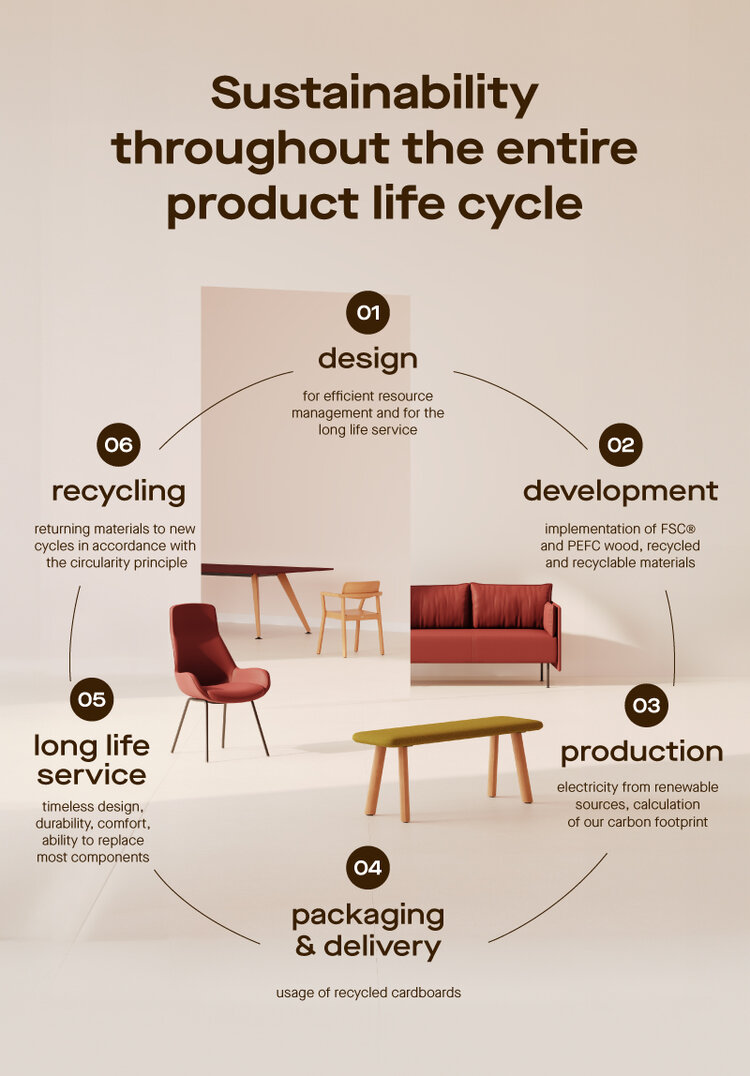
Kusch+Co products are synonymous with long life cycles and optimum recyclability. From the first design drafts of a new product, we take all environmentally relevant components and production processes into consideration, ranging from materials selection and design all the way to manufacturing processes, which also contributes towards our sustainable energy footprint.
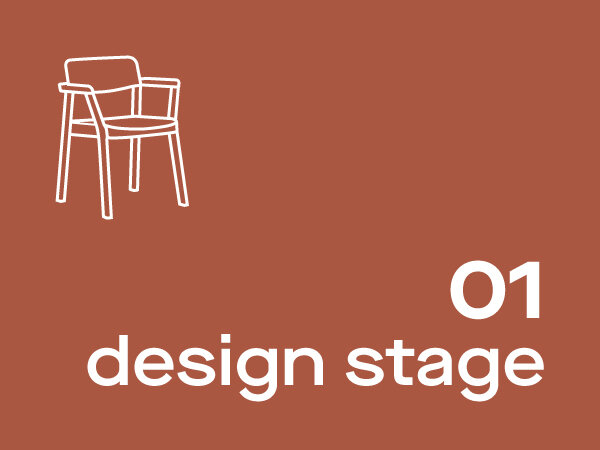
Design for efficient resource management and for long service lives.
Our contribution to sustainable development begins at the design stage. We use raw materials by respecting finite natural resources, and work with designers, who appreciate the natural world as much as we do. They strive to minimize the use of materials, make products recyclable, and ensure long product life.
Antonio Scaffidi, the designer of Embla, displays a creativity that is based on a deep understanding of nature, and manifested in his designs.
All wood for our products comes from sustainable, legal and verified sources that conduct sustainable forest management.
Design for sustainability means:
· Timeless and ergonomic design
· Reduction of materials
· Durability, including high-quality materials
· Modularity, flexibility
· Well-thought-out base design
· Option of replacing used components.
Explore Kusch+Co’s approach to designing for sustainability.
Inclusive design
Given our experience in designing solutions for healthcare premises, we understand the needs of persons with reduced mobility well. We keep them in mind when creating each new product. PRM terminal bench seating, higher chairs with stable armrests, extra weight capability - our solutions make all spaces – living, working, travel or entertainment more accessible to senior citizens, pregnant women, persons of short stature, as well as persons with a specific disability.

Seating must fulfil the following requirements for persons with reduced mobility:
• Seat height of at least 48 cm
• Seat surfaces enabling them to sit upright and to get up more easily
• Stable armrests providing good support
• The legs should be positioned as vertically as possible, so that they do not become
a trip hazard.

Airport Seating

For passengers with reduced mobility, it is possible to raise the seat height of one or more seats within a bench row / configuration. The stable arms provide extra support, facilitating sitting down or getting up. These benches meet all the requirements of EU Regulation No. 1107/ 2006 which, among other things, regulates the availability of appropriate seating for passengers with reduced mobility.

For passengers with reduced mobility, it is possible to raise the seat height of one or more seats within a bench row / configuration by using spacers:
• 8000 by Studio F.A. Porsche – by 4 cm
• V-Travel by Justus Kolberg – by 5 cm or more
• Terminal by Prof. Jorgen Kastholm – by 5 cm or more.
At the same time the seat ergonomics is changed, the seat angle is a 20 mm more upright to make it even easier to stand up and sit down.
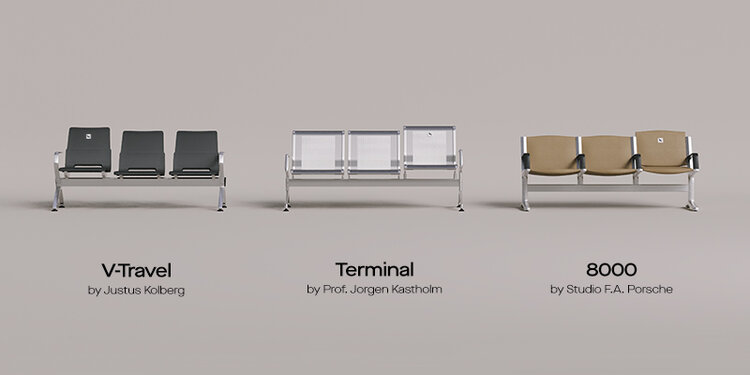
Bariatric Seating

Seating adapted to the needs of overweight persons must meet a set of specific requirements to accommodate overweight persons and offer them a comfortable seat.
The seating:
• must be able to support a high weight
• has to offer a generous amount of space, especially width
• requires a very sturdy construction
• should offer custom seat heights, making it easier to get up.
Explore Kusch+Co’s approach to designing for persons with reduced mobility.

This is where design sketches physically take on three dimensions, the lines drawn in pencil transform into those made of wood or other sustainable material, and thus the idea turns into a real product. This is where our experts use all their knowledge and experience to make the best of the design and materials for the sake of our planet.
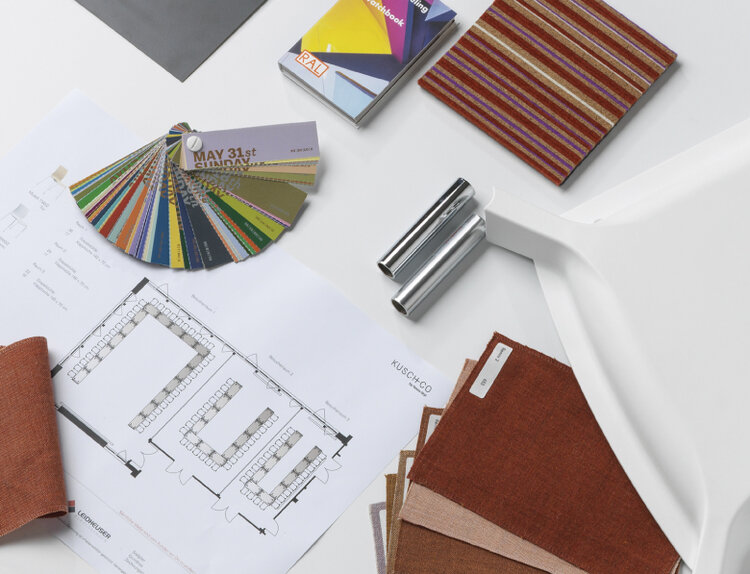
-
· Reducing material usage – to save material, and to reduce weight
· Production optimisation (for example: one mould can produce 4 foam parts:
an outer seat, poufs, and sofas, each in two versions)
· Component universality and minimal number of components
· Ability to replace most components
· Use of materials with maximum reduction of formaldehyde and VOC emissions
· Use as little material and energy as possible.

Designed and developed with care for our natural environment, the product is ready to be manufactured for end-users, to serve them and elevate their everyday experience over the long term. At Kusch+Co, the production process, this moment of reaching out to the end-user, is also the moment when we pay the most attention to every aspect of sustainability.

Decarbonisation
Kusch+Co GmbH is aware of the need to reduce CO2 emissions, making decarbonisation one of the strategic goals. In 2021, we started calculating our carbon footprint in accordance with the requirements set out in the ISO 14064-1 standard and the GHG protocol. Our efforts focus on our organisation's direct and indirect emissions, using the GHG Protocol methodology - Scopes 1 and 2.
· Scope 1 - direct emissions from fuel consumption from sources owned or controlled
by the organisation.
· Scope 2 - indirect emissions mainly from the consumption of electricity generated in
outdoor installations.
Kusch+Co uses electricity from renewable sources.

Quality management
To guarantee consistently high product quality, Kusch+Co is certified in accordance with the DIN EN ISO 9001:2015 quality management system and the DIN EN ISO 14001:2015 environmental management system.
Suppliers
When selecting our suppliers, we pay attention and strictly verify their responsible use of raw materials, resources, and energy, as well as the reduction and recycling of waste.
Raw materials
All wooden products come from sustainable, legitimate, and verified sources, which is confirmed by the following certificates: FSC® (FSC®-C155352).
The FSC® certificate is a guarantee of sustainable forest management. The programme is based on the principles of sustainable development and responsible forest management practices and on principles that enable the traceability of trade in and production of wood products from certified forests.
Use of materials with maximum reduction of formaldehyde and VOC emissions
We do not use harmful substances in our products (substances listed in Candidate List of AVHC and annexes XIV, XVII of the REACH Regulation with concentrations of more than 0.1% w/w are not knowingly used).
We only use substances and mixtures for which the corresponding safety data sheets are available. Our in-house quality, environmental and occupational health and safety management systems ensure strict compliance with processing guidelines. We already exclude borderline substances during product development. The total formaldehyde values of our products are always below the legal requirements. Nevertheless, we still try to reduce the proportion of solvent-based adhesives.
Paint finishes using water-based varnish
By using water-based varnish, we have reduced emissions of volatile organic compounds to an absolute minimum. Furthermore, our paint-spray cabins have been retrofitted with a dry filtration system, replacing the wet extraction system, and saving energy and water. The dry filter achieves the best possible results in collecting the overspray, which can be treated like regular household waste when dried. The water-based varnish used do not contain any harmful substances.
Our selection comprises fabrics sourced from natural renewable sources: wool and flax.
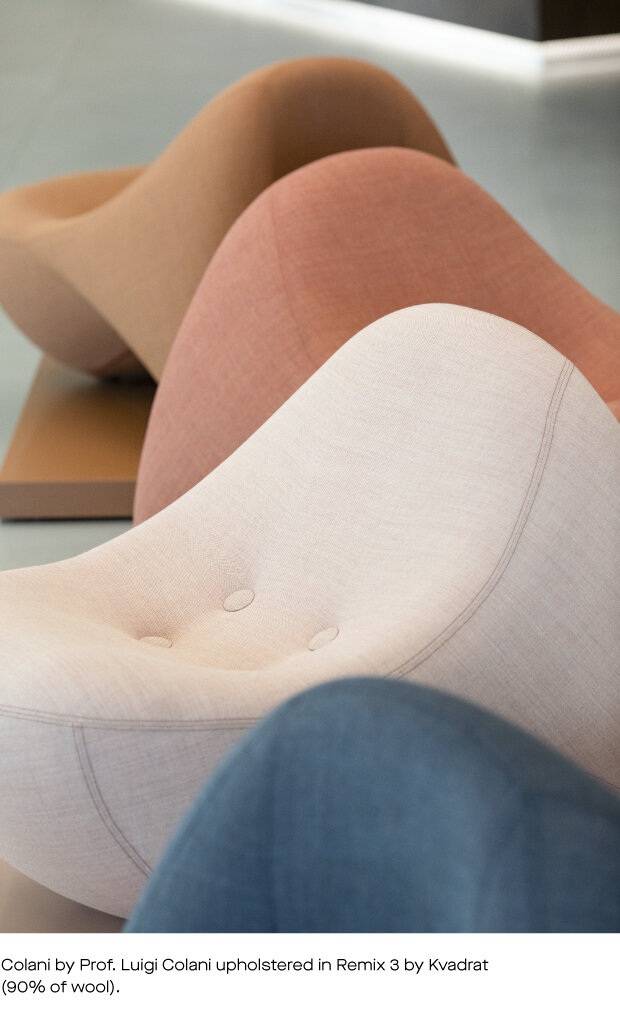
Wool is a natural and renewable material that grows quickly. Woolen textiles, thanks to their high durability and with proper maintenance, age beautifully and contribute to extending the product life cycle.
We select woollen textiles from producers who acting responsibly care for animal welfare, and are certified to the EU Ecolabel.
Flax needs minimal water for cultivation, and during growth, each hectare of flax absorbs 3.7 tonnes of CO21.
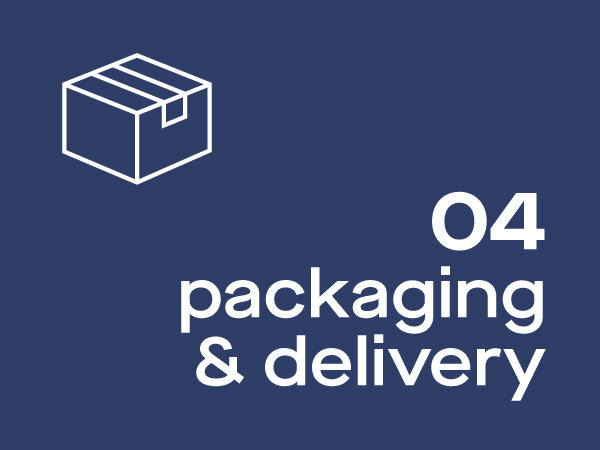
Packaging
Packaging materials are reusable, and we really do use them multiple times. Our packaging materials are recyclable, and are for the most part made of recycled mixed materials. We take packaging materials back and reuse them several times, before they are fed into the recycling cycle.
Delivery
Our logistics operators have provided our company with long-term strategies concerning sustainable development reports (including reduction of greenhouse gas emissions) which represent targeted plans for achieving certain objectives.
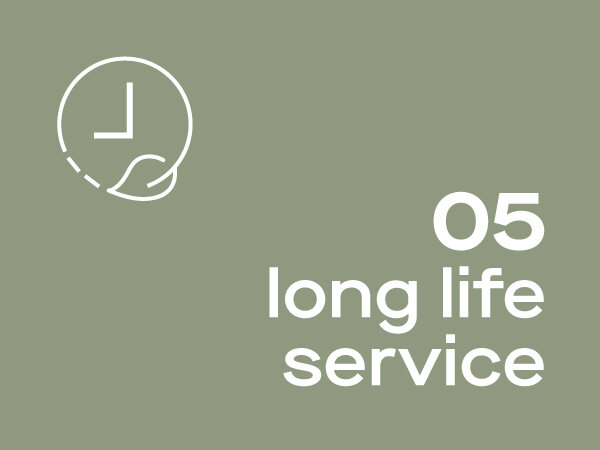
The longevity of the product is influenced by various factors, including timeless and ergonomic design, which makes the product look fresh and modern; durability, as a result of which the product provides comfort over a long period of use; and the ability to replace most components. The designers, who create for Kusch+Co aim to achieve all the above in every piece of furniture they introduce to the market. Our products are also subjected to stability, strength, and durability tests.
¡Hola! chair, designed in 1996 by Jorge Pensi, still impresses with its timeless design – it was great yesterday, it is an excellent choice today and will easily fit into the spaces of tomorrow.
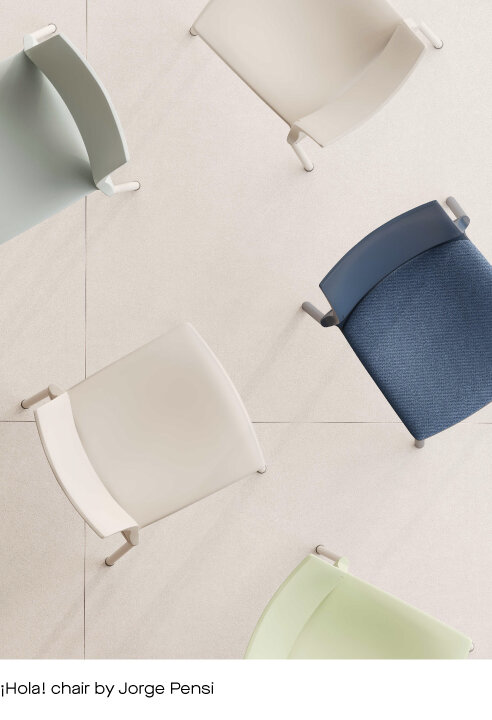
Creva Soft Seating by design studio kaschkasch is guaranteed to have a long service life, with most components being replaceable and retrofittable.
In Njord, designed by Antonio Scaffidi and Mads K. Johansen, solid wood meets felt – these two materials can be separated up to 90% to be later recycled and reused.
As a man is in the centre of the brand’s interest, Kusch+Co wants to give him the quality, that can truly support his dynamic work- and lifestyle, his daily routines and the environment he lives in. Being aware of how the connection with nature influences human well-being, we at Kusch+Co we focus on bringing out the natural beauty of raw materials, like wood, in our products.
Embla beautifully highlights the natural material and gives the user the satisfaction of communing with nature.
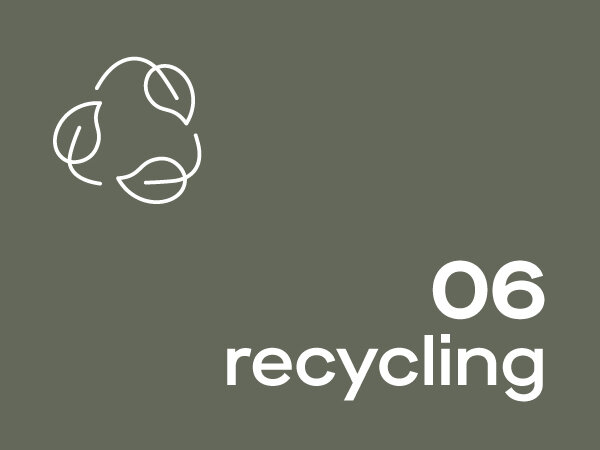
Our products contain a high proportion of renewable raw materials, materials that can be separated by type and are easy to recycle. For most of them, it is already over 90%.
Plastic
We use easily recyclable components made from polypropylene, polyethylene and polyamide as separable components and label them to facilitate the separation of materials in the end-of-life/recycling stage.
Polyurethane foam parts
All leftovers are recycled by our suppliers. We separate the materials before returning them. This process is an integral part of our workflows.
Metal
All metal parts that we cannot process are recycled.
Aluminium
We use almost exclusively recycled aluminium.
Wood
We only use wood from environmentally responsible sources, which guarantee, that in place of every tree – a new one will grow. We do not reduce forest resources.
Textiles
To minimize waste and move within the circular economy, we use textiles made of post-consumer recycled polyester, that additionally is recyclable. Post-consumer recycled polyester textiles we offer is EU Ecolabel and STANDARD 100 by OEKO-TEX® certified, which guarantees that the article does not contain harmful substances.
All waste materials generated by our production processes (fabric residues, leftover foam, metal cuttings) are almost entirely collected and processed by authorised recycling companies. Wood waste, accumulated during the processing of wood materials and wood components, is used as biomass to produce thermal energy.
Kusch+Co as a part of Nowy Styl
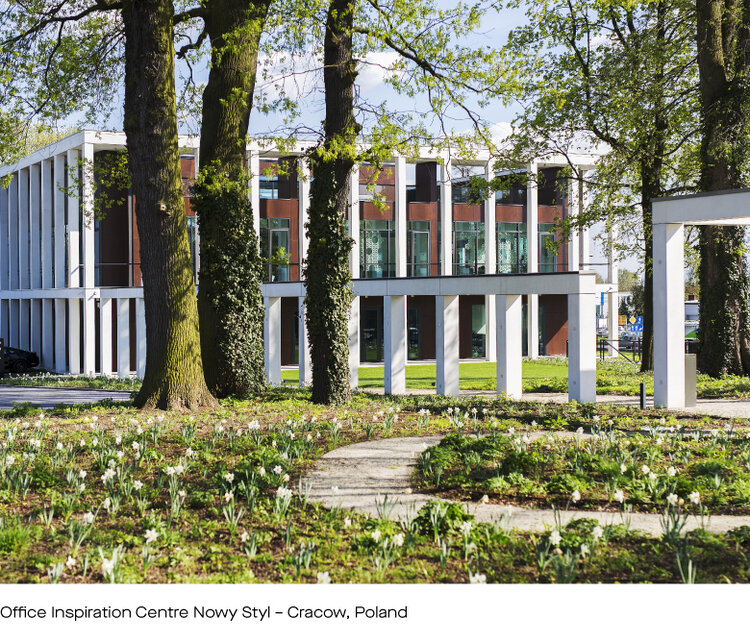
Kusch+Co is a member of the Nowy Styl group of international companies.
It is in Nowy Styl’s social responsibility to comply with ethical standards protecting human rights and fair business inside our organisation and all along our value chain.
We apply specific internal and external policies to ensure this, including: Code of Ethics, Supplier Code of Conduct and Procurement Policy, which extend the standards of ethics and social, economic, and environmental responsibility for Nowy Styl suppliers.
Check out the Nowy Styl Sustainability report that we compiled in line with GRI standards and verified together with Deloitte.
As a part of Nowy Styl, Kusch+Co was also subjected to an EcoVadis assessment – Nowy Styl has once again received the highest possible EcoVadis assessment in 2025 – the Platinum Medal.
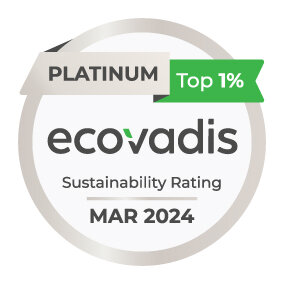
Nowy Styl supports the United Nations Global Compact’s ten principles in the areas of human rights, labour, the environment and anti-corruption.
Supporting diversity
We have signed the Diversity Charter, an international initiative for promoting equal treatment and diversity at work, coordinated by The Responsible Business Forum. The Charter has signatories in 26 EU countries.
Signing the Diversity Charter means the whole organisation, including its employees, as well as social and business partners, is ready to counteract any discrimination at work, to promote and create diversity. Organisations that decide to implement the programme foster social equality and coherence.
Joining this initiative confirms that diversity and human rights are integral parts of our organisational culture.
